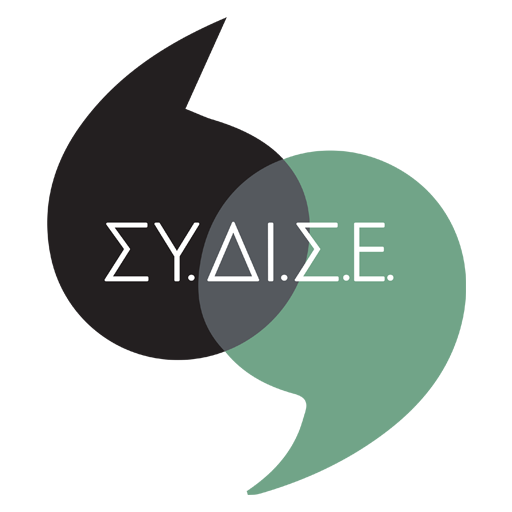Court interpreting is an extremely demanding line of work. Nonetheless, the Greek state has set the bar low in terms of qualifications, and the rates paid to court interpreters are similarly low, resulting in the quality of court interpretation being far from satisfactory. In Greece, court interpreters are not required to have any training, which is a prerequisite in other countries. Their working conditions are unacceptable. Mostly interpreters are not given the opportunity to study the court brief, which makes their work even more difficult. SYDISE believes that, following the example of countries such as Switzerland, Germany and the US, only trained interpreters having passed relevant exams should be included in the registry of court interpreters.
SYDISE steadfastly promotes life-long learning and continuous professional development. Since 2020, it has been organizing courses and seminars on court/legal interpreting for its members, who are highly qualified conference interpreters, university graduates and holders of post-graduate degrees, with many years of experience and / or accredited to work in various international organizations and agencies.
We firmly believe that court (or legal) interpreting in Greece is in need of a radical reform. There is no need to reinvent the wheel. Inspiration can be drawn from the models adopted in other countries in order to organize anew this sector. This has become an even more pressing need following the refugee crisis and the arrival of a large numbers of foreign nationals in in Greece. Correct interpretation is the only way to ensure a fair trial to everyone irrespective of their native language or origin. The highly qualified members of SYDISE are ready to contribute to the reform of this vital sector with their in-depth knowledge and experience.
With this in mind, SYDISE has successfully staged an event on “Interpreting in Court and other Legal Settings” on 7 December 2021 at 18.00 pm, at the Goethe Institut, 14-16, Omirou street, Athens. The event features a plethora of distinguished panelists from academia, lawyers, judges, notaries and mediators. The aim being to launch a serious dialogue that will pave the way for a thorough reform with a view to improving interpretation in court settings and set the foundations for fairer trials for all in Greece.
Watch the speakers in our playlist on SYDISE’s YouTube channel.
Title: Cooperation between interpreters and all professionals in a courtroom is instrumental to achieving a better procedural outcome.
Session 1
Moderator: Katerina Apostolaki, Conference Interpreter, Member of SYDISE
1. Presentation of the Hellenic Association of Conference Interpreters (by the President of SYDISE) (in Greek)
SYDISE President, Maria Petrocheilou, a professional translator and conference interpreter for the last 20 years, presents the Greek Association of Conference Interpreters, its establishment, members, and admission criteria. She defines the various types of interpreting: conference, court, community, and bilateral. She specifically focuses on court interpreting and outlines the applicable legal framework, particularly highlighting the problems it involves. Maria Petrocheilou then refers to the relevant EU legislation, in particular Directive 2010/64/EU of the European Parliament and of the Council on the right of counterparties to interpretation and translation in criminal proceedings. In the end, she presents SYDISE’s proposals on court interpreting in Greece
2. Welcome address by the President of the European Legal Translators and Interpreters Association (EULITA), Ms Daniela Amodeo Perillo (in English)
Daniela Amodeo Perillo, President of the European Legal Interpreters and Translators Association (EULITA), underlines the importance of proper training for court interpreters and legal translators, a core element of EULITA’s scope. She explains that the thorough knowledge of the legal framework and a good command of the legal terminology relevant to the working languages of each professional, combined with the sound cooperation among all professionals involved in the judicial sector, would, among other things, greatly contribute towards a better appreciation of the interpreters’ and translators’ work in legal settings. All the national associations—members of EULITA—stand for the recognition of the professionals they represent as key players in any litigation process involving non-native speakers. In addition to the current European legislative framework, she cites two recent rulings of the Irish Court of Appeal and of the European Court of Justice, which highlight the need for the quality of court interpreting to improve and which offer hope for the future.
3. Address by Prof. Dr. Sotirios Livas, President of the Department of Foreign Languages, Translation and Interpreting – Ionian University (in Greek)
Sotiris Livas, Athens-based lawyer, Professor at the Department of Foreign Languages, Translation, and Interpreting of the Ionian University, and President of the Department since 2018, speaks in his dual capacity as a lawyer who uses interpreting services and as President of a university department that trains interpreters. International law, he points out, provides for the right to interpretation as a right of access to information and to the courtroom for all parties to the proceedings. Sotiris Livas outlines the institutional framework for court interpreting in Greece, which is suffering from the lack of criteria for inclusion in the Court Interpreters’ Roster and from the very low fees offered. He underlines that accurate and valid interpretation is a prerequisite for safeguarding full rights for all parties to a trial, adding that the state should seek to establish an appropriate setting for the accomplishment of this goal. From his standpoint as President of the Department, the speaker also addresses the training requirements for new interpreters in Greece.
4.A successful example of court interpreting: the European Court of Justice (in Greek)
Lila Koukosi, Conference Interpreter, Greek Booth, European Court of Justice
Eleni Papadopoulou-Thiessen, Lawyer-Linguist, Greek translation department, European Court of Justice
Lila Koukosi, a permanent employee of the Interpretation Service of the Court of Justice of the EU, speaks about interpreting in legal environments, in particular at the European Court of Justice, and stresses the importance of the Court’s decision in Case C564 of 2019, which is available in all 24 official languages of the EU. She presents the multilingual operational context at the CJEU with 24 languages which enjoy equal status—a unique phenomenon worldwide for an international judicial institution, which ensures both equal access to justice and equality of arms (a fair hearing) for all citizens and the uniform construction and application of European Law in all 27 member states.
Eleni Papadopoulou Tiessen, a legal linguist in the Greek translation department of the Court of Justice of the European Union (CJEU), explains how multilingualism operates in the context of a written procedure before the CJEU and how the Court’s translation service functions: only linguists with full legal training and an excellent command of at least two official languages in addition to their mother tongue are employed. She outlines the difficulties of legal translation in the CJEU, particularly in the light of multilingualism, which have not, however, led to any incorrect decisions as a result of linguistic misunderstandings.
5. Short address by Dr. Panagiotis Nicolopoulos, Head of the Legal Section of the Athens Bar Association (in Greek)
Dr. Nikolopoulos, Assistant Professor at the Athens Law School and lawyer before the Supreme Court, discussed administrative and civil court procedures which may sometimes entail the examination of a non-Greek speaking witness in Greek. He also highlighted the importance of mediation, which is a new procedure expected to evolve and expand.
Interpreters are faced with certain inherent difficulties when they need to access documents, e.g. in criminal proceedings, where documentation during the pre-trial phase is confidential and access is contingent on prior authorization by the public prosecutor. At times, foreigners appearing in court rely on associate lawyers who speak their language to have the content of the proceedings rendered to them.
Dr. Nikolopoulos finally added that there had been no collaboration between interpreters and bar associations so far and stressed the importance of establishing such cooperation as well as the significance of communicating interpreters’ concerns to the plenary of bar associations.
6. Interpreters: a valuable ally in the preparation and the hearings of UK Court Cases & UK based Arbitrations (in English)
Alex Clements, Director at Bond Solon
Alex Clements, Director of Bond Solon, a company which partners with leading law firms from around the world to prepare witnesses before they give evidence in court, speaks about the valuable contribution of professional interpreters in the preparation for hearings in the UK. Through practical examples, he sheds light on the role of professional interpreters, who, among other things, ensure the objectivity of the proceedings. He also refers to online hearings, a process necessitated by the pandemic restrictions, in the context of which flexibility and technical knowledge on the interpreters’ part were absolutely essential.
Session 2
Moderator: Dr. Anthi Wiedenmayer, Associate Professor, Aristotle University of Thessaloniki
7. Acquaintance with Public Service Interpreter SV 2810 (legal section). A piece of Science Fiction (in Greek)
Prof. Dr. Stefanos Vlachopoulos, Department of Foreign Languages, Translation and Interpreting – Ionian University
Prof. Stefanos Vlachopoulos who teaches interpretation at the Ionian University – the only university in Greece that trains interpreters at undergraduate level – elaborates on the landscape of court and legal interpreting in Greece, listing all the prerequisites for providing high quality interpreting services. He provides an illustrative example of the future public service interpreter in Greece based on a virtual scenario of the ideal interpreter SB2810.
8. Court interpreting – the Judge’s point of view (in Greek)
Vasilis Portokalis, Justice of the Aegean Court of Appeal
Vasilis Portokalis, Justice of the Aegean Court of Appeal, addresses the issue of interpretation in court from a judge’s point of view, focusing on civil and especially criminal justice in Greece. He presents the current legal framework and eloquently describes the practical problems that sometimes arise at the various stages of criminal proceedings. He further puts forward a proposal for the establishment of a special translation service at the Ministry of Justice involving specifically trained interpreters.
9. Interpretation at notarial offices (in Greek)
Eleni Kontogeorgou, Vice-President of the Notaries Association of the Court of Appeal of Athens, Piraeus, Aegean and Dodecanese Islands
Eleni Kontogeorgou, Vice-President of the Notaries Association of the Court of Appeal of Athens, Piraeus, Aegean and Dodecanese Islands describes the needs for interpreting services at notary offices, when affidavits are signed before notaries and notarial deeds are drawn up with non-Greek speakers. She refers to discrepancies between theory and practice and addresses the issue of interpretation fees in notarial settings.
10. Interpretation in mediation proceedings (in Greek)
Aikaterini Kotsaki, President of the Hellenic Association of Mediators
Aikaterini Kotsaki, President of the Hellenic Association of Mediators talks about Interpreting in mediation and out-of-court dispute resolution and provides some examples of how it can contribute to the success or failure of a mediation process.
The event was web streamed live and simultaneously interpreted into English and/or Greek.
The original statements are available on SYDISE’s YouTube channel








